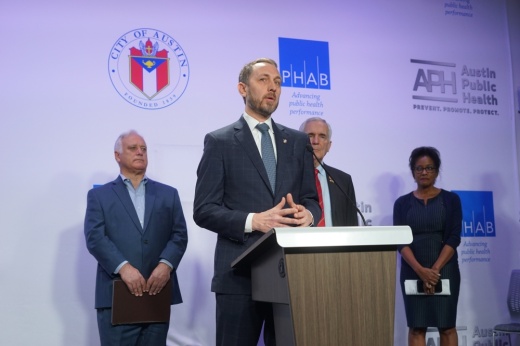Austin’s drug crisis
Travis County leaders declared drug overdoses a public health crisis in May of last year, following a report that showed drug toxicity was the No. 1 cause of accidental death in Travis County in 2021.
Since then, fatal overdoses have steadily increased. In 2021, 308 people died of drug overdoses in Travis County, while 199 people died from an overdose in just the first six months of 2022, according to the medical examiner’s report.
Travis County is specifically seeing an uptick of fentanyl-related overdoses, as they accounted for 59% of drug deaths in the first six months of 2022 compared to 38% in 2021, Travis County Judge Andy Brown said.
Further, the number of female, Black and Hispanic residents who died from a drug overdose have all increased significantly since last year, Brown said.
The full report on fatal drug overdoses in 2022 will be released in April, Brown said.
“[Drug overdoses are happening] to our friends, our coworkers and our neighbors,” Brown said. “If you’re struggling with an addiction to drugs, reach out to someone who can help. It’s not a weakness to [get help].”
Fatal overdoses in Travis County within the first six months of 2022 occurred all throughout the county and in no specific neighborhoods, Said Desmar Walkes, Austin-Travis County public health authority. The vast majority of overdoses occurred in one’s home, according to the medical examiner’s report.
How the funds will be spent
The $2 million will be given to Austin Public Health and is expected to last two years. Funding will go toward hiring at least nine peer support specialists with lived addiction experience and training for at least 250 residents on how to administer Narcan—an overdose-reversal drug—and how to identify an overdose, Walkes said. Existing peer support contracts will be extended as well.
Training will also be given to health providers themselves to prevent cycles of dependency, as addiction can stem from pain killers given at the hospital, Walkes said.
Aside from training, funds will support a dedicated education campaign to get information in the community, Walkes said.
“One pill can kill. No matter your age or gender,” Walkes said.
Looking ahead
Rep. Lloyd Doggett said city, county and state leaders are also working toward legalizing fentanyl test strips—small strips of paper that can detect fentanyl in a variety of drugs—and ramping up on Good Samaritan laws so residents can call 911 without fear of legal consequences.
Any Austin-area resident can pick up Narcan for free from the Sunrise Community Church or Sahara Lounge in East Austin, said Cate Graziani, co-executive director at Texas Harm Reduction Alliance. People who use drugs can also call the Never Use Alone hotline, 800-484-3731, and operators will stay on the phone with callers in case they overdose.





